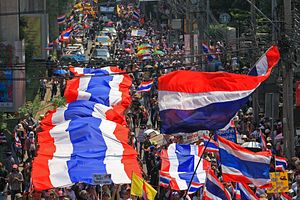Since 2014, Thailand’s Prime Minister Prayut Chan-o-cha has been addressing the public through his weekly speeches, which are broadcast live on all television channels. This is government propaganda but democracy advocates can also invoke some of the statements made by the former army general to push for the early restoration of civilian rule in the country.
For example, on May 29, Prayut said that he doesn’t intend to remain in power for many years.
“The reform of the country in all aspects may take many years. I am not aiming to carry out all the reforms myself by staying in office for years. It is something that must be passed on to the next elected government.”
Prayut even offered an advice to the next government: “For those who are about to be elected to administer the country, please do not let the Thai people return to fighting with each other again, thus leading to another divided society, without a sense of rule of law, the underprivileged being exploited, widening social disparities and the lack of social justice.”
On June 12, he summarized the mission of the military which grabbed power last year. “The [military government] took approximately six months to restore peace and calm. The other six months was spent to administer and expedite plans and disburse state budgets. Further reforms will be done after phase 3, when an elected government takes office.”
But Prayut also hinted that the army is also ready to intervene again if the new government fails to rule effectively. “What to do if the elected government cannot take office due to opposition by the other faction? The [military] will take responsibility over this issue, and the government will also monitor this situation.”
It is difficult to ascertain if TV viewers are receptive to Prayut’s pronouncements, since public protests are still banned and criticizing the government, whether online or offline, can provoke army surveillance and investigation. Popular or not, the junta is assured of a captured audience. Reviewing Prayut’s speeches is therefore important to understand how he communicates the government’s policies to ordinary Thais.
The speeches reveal what Prayut thinks are the major problems besetting the nation. In the past month, he devoted a lot of time to discuss the plight of poor farmers, the impact of climate change, and innovations to improve agricultural productivity.
Prayut is also known for delivering unusual references in his remarks so it’s hard to know if he is being humorous or not.
Commenting on water scarcity, he mentioned this: “The foreign community is already well-aware of the climate change issue. They are also concerned about having no water to use. Some are fortunate in having snow. We only have rain to rely on.”
Perhaps referring to journalists who have been persistent in inquiring about the country’s political roadmap, he frankly stated that he has little patience over this issue.
“Please do not ask these matters of me again. I have to spend a lot of time to answer these questions over and over again, instead of getting things done. So I sometimes become agitated when I am deprived of working time, so please ask more substantive questions.”
Prayut has been consistent in pointing out the weaknesses of politicians he ousted from power.
“Please disregard the false information that some people (such as politicians from previous governments) have tried to feed you with. All they want to do is denounce and blame the current government. With this, national resilience is undermined.”
Prayut even mentioned a Western scholar when he discussed the decision of the army to launch a coup and declare martial law. “Today, I will quote Prof Michel Troper, a well-known scholar from the University of Paris, who said a military coup does not always sabotage democracy, as in the case for some countries, it has been done in order to prepare a country for a an imminent democratic system.”
The average length of Prayut’s TV addresses is 49 minutes, although he cut his latest appearance to 30 minutes to allow more time for broadcasting the Southeast Asian games in Singapore. That was bad news for deputies and Cabinet members who were deprived of a free platform to air their message but it must be good news for the bored TV viewers who had more time to view a different Friday entertainment program.

































